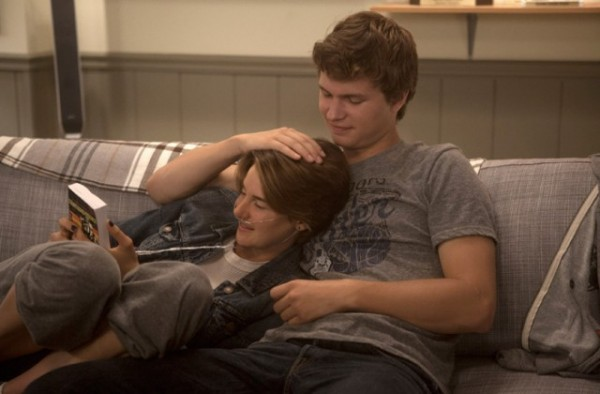“Pain demands to be felt”
We all die. Heaven, Hell, Purgatory, Oblivion: they’re all destinations that connote life has ceased to be.
This is the constant; what you do during the interim is not. So whether you’re healthy, sick, sad, or happy, you have the power to make the best of any situation. You do. Not your parents, friends, loves, idols. You. Nothing teaches this lesson in literature better than the kind of cancer tome John Green hoped to put his own unique spin on withThe Fault in Our Stars.
A genre rife with cliché to help the living and dying cope and not be alone, Green looks to infuse an authenticity of emotion without placation as well. He utilizes the inherent clichés but through a filter of sarcasm and stark realism, letting them exist naturally rather than as fortune cookie philosophizing.
Because while the story is sad—the sort of young adult fiction forcing fan girls to cry in the aisle with a box of tissues—it’s also genuinely uplifting. The reason is that its leads are already products of miracles and no longer the kids they were when diagnosed. Hazel (Shailene Woodley) has cheated death thanks to an experimental drug leaving her permanently attached to an oxygen tank; Augustus (Ansel Elgort) has defeated his ailment with a brutal year of pain and the amputation of his lower leg. They’ve gone through the cycles waiting for the Grim Reaper to arrive and have accepted their fates with appropriate cynicism to contrast their optimistic parents quick to turn on fabricated airs of idealism simultaneously adorable in their unwavering faith and warranting a smack in the face for their over-reaching ridiculousness.
But despite the obvious pain and heartbreak waiting all on the horizon, a glimmer of hope arrives in the form of true star-crossed love. I’m not talking boy and girl lusting to lose their virginity before they die tragic deaths way too soon either—actual love wherein the inevitable gut punch will be worth the brief time spent together. Green doesn’t think so highly of himself to remove the lusting completely (enterNat Wolff‘s Isaac), but he does push it to the background with Hazel and Augustus. Heck, they’re so mature for their age that they almost go the “just friends” route in the assumption it will somehow save a modicum of suffering at the end. Instead it only makes us understand the strength of their feelings before the time for a release of emotion is no longer avoidable.
They’re kind of perfect for one another too—she the pragmatic realist and he the dreamer of longevity and greatness. She can be crabby when placated and he’s a smug SOB from the start. But there’s something utterly endearing about them both: in her embarrassment towards being called gorgeous and his infuriating smiling stare gradually chipping away at her defenses. It’s as though they were destined for each other, possess the gooey centered plot progression to put them on their collision course, and yet I never rolled my eyes. They’re too three-dimensional and legitimately awkward in having no clue what to do when confronted with love after lives spent as pariahs to be simply taken as fictional constructs meant to manipulate us. Green hasn’t given them life to conjure tears of pity; he’s crafted beacons of light instead.
Credit screenwriters Scott Neustadter and Michael H. Weber—of (500) Days of Summer and The Spectacular Now fame—and director Josh Boone for helping usher Green’s story to the big screen. They found ways to condense the book by excising in-depth passages detailing the more gruesome moments of cancer while ensuring we still understand the complexities of two teens living with more weight than anyone should have placed on their shoulders. The performers also make it possible to turn this dark, depressive subject matter into an example of how to face adversity with dignity by refusing to give up and somehow finding a reason to live when giving up is much easier. And that goes for Woodley and Elgort as well as Hazel’s folks (Sam Trammell and Laura Dern) because everyone the disease touches is ultimately a victim.
There’s humor thanks to Wolff’s comic relief; unexpected bite from an out-of-place yet completely refreshing supporting role played by Willem Dafoe; and a whole lot of tear-jerking eulogizing before anyone even finds themselves permanently calling a hospital bed home. Beyond the puppy love that works above its YA tropes are also wonderful asides like Hazel pitying her mother’s ever-vigilant readiness for the worst as though it is all that presently identifies her and intelligently poignant words such as one character proclaiming desolately that someone dying of cancer is a “side effect … a failed experiment in mutation”. That’s the sort of stuff reserved for more weighty drama then teenage swoons reveling in the pain of lost love they hope to one day find and keep and it’s a credit to Green for not sacrificing truth for mainstream appeal.
In the end The Fault in Our Stars isn’t as sad as expected because of that undying message of strength underneath. Life for Hazel and Gus is anything but a cakewalk through it’s twists and turns swapping their positions as survivor and dying, yet when they’re in each other’s presence they can’t help feel as though they’re the luckiest creatures to ever have lived inside their personal infinity. They are children who refuse to sugarcoat anything, dreaming of happiness in the now rather than an impossible future. Ideas of one’s legacy being more than universal adulation crop up as the concept of fate dealing bad hands gets subverted by its prey living in spite of that finality. Because we all live forever through those we touch—like stars not soon forgotten long after they’re gone, our memories remain.
Score: 7/10
Rating: PG-13 | Runtime: 125 minutes | Release Date: June 6th, 2014 (USA)
Studio: Twentieth Century Fox Film Corporation
Director(s): Josh Boone
Writer(s): Scott Neustadter & Michael H. Weber / John Green (novel)

